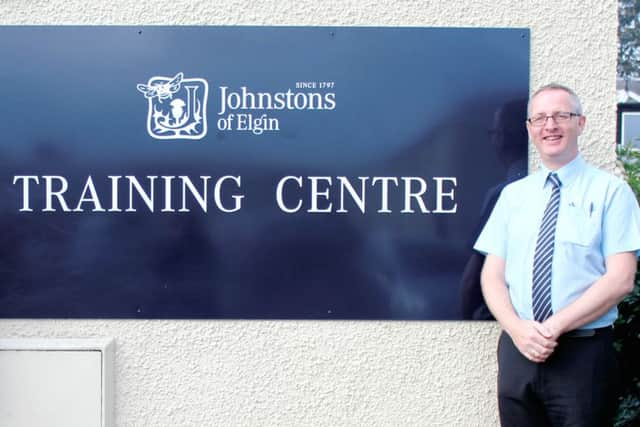Innovation woven into fabric of Scottish firm's workforce


Nothing could be more traditionally Scottish than a tweed jacket or a fine woollen sweater. But if you are thinking that traditional means that the processes and procedures – or the designs – are stuck in the dark ages, then think again.
Johnstons of Elgin is a company where the employees have a voice. And the results are evident in the quality of the products and the success of this growing Scottish textiles business.
Advertisement
Hide AdAdvertisement
Hide AdWorkplace innovation practices are enabling this long-established textiles company to reinvent itself as a lean and successful modern business, competing effectively in a global market.


The company employs 1,000 people, between its two factories in Elgin in Moray and Hawick in the Scottish Borders.
Each location has a specialism. Weaving takes place at the Elgin factory and the knitwear is produced in Hawick. A single management team draws the business together.
The company has a shop in New Bond Street, London, a successful website where it sells direct to the public, and many product ranges which it creates for exclusive brand names.
The business is out there on the world’s catwalks, showing off its finest cashmere garments and high quality tweed textiles.


So how is it doing it? Chief executive Simon Cotton explains that it is workplace innovation concepts that are making a difference.
Cotton, who joined Johnstons three years ago, says: “Workplace innovation might be a new label, but the idea of valuing our people goes back way before that term, or my time here.
“There is a long tradition of recognising the value of the skilled workers who create our high-end luxury products.
Advertisement
Hide AdAdvertisement
Hide Ad“It dates back at least to the 1950s and undoubtedly before that. Our business is rooted in the craft tradition, where the expertise of skilled craftspeople is honed over decades.
“Because of this we really understand that it is the skilled workers who are best placed to come up with innovations.
“They are the people who will improve workflow and increase efficiencies in the production process.
“What is different today is the pace of change. To compete, we have to be agile, flexible and responsive.
“The market demands new designs with small batches of luxury products, manufactured to high specifications and delivered to tight schedules.
“All of that puts pressure on our processes. Our people have to be ready and equipped to respond.”
Workplace innovation is a concept that is growing in popularity across Europe.
Recently Scottish Enterprise has stepped in to help Scottish businesses benefit from this thinking, which puts employees and their ideas firmly at the centre of business success.
Advertisement
Hide AdAdvertisement
Hide AdPut simply, it’s about creating a culture where staff are fully engaged and supported to reach their full potential.
A core idea is that workers will be more fulfilled if they can contribute to making real improvements to the business.
At Johnstons, Cotton sees this as self evident. “Every business talks about how its people are its most important asset.
“At Johnstons we don’t just talk about it, we live and breathe it.
“We find the frustrations people have in the workplace are almost always the same things that cause inefficiencies for the business.
The best people to identify these frustrations are generally the people who come across them on a daily basis.
“Our role as managers is to help provide the mechanisms that turn those small daily frustrations into successful tweaks to our processes, making the business ever more efficient and improving the employee experience, all at the same time. We’ve worked hard at empowering staff to take control, to share their knowledge and expertise, improving the processes and enhancing their own experience.”
Willie Wood, human resources director at Johnstons of Elgin, takes up the story and explains the role of education and training in developing the workforce.
Advertisement
Hide AdAdvertisement
Hide Ad“People right across the organisation are committed to the idea that developing skills will bring personal benefits and business benefits too.
“Again, many of our training initiatives originate with our workers. Our experienced workers are committed to passing on their skills to the next generation.
“We call ourselves ‘the learning organisation’ because training and development have become such a way of life.
“One of the big challenges that we have been working on is to bring new skilled people into the business and training is vital for this.
“Traditionally, the textiles industry has been dependant on an older workforce, predominantly female. To sustain the business we must have young people coming in. So we needed ways of attracting young people, training them up and then inspiring them to stay on as the skilled workers of the future.
“Our response to this challenge is our training academy, based in Hawick, along with interactions and collaborations with schools in the communities where we sit.
“With support from the Scottish Qualifications Authority (SQA) and Skills Development Scotland we set up a modern apprenticeship scheme.
“Within our training academy six modern apprentice places are available each year. We’ve seen great successes.
Advertisement
Hide AdAdvertisement
Hide Ad“Of the 12 apprentices employed in our first two years of operating the academy, 11 of those are still with us. We are now on to intake three.
“It’s not just about training up new recruits however,” Wood continues.
“Everyone in the business can benefit from a culture where learning and growing is seen as normal.
“We’ve been working hard at providing training to existing staff – offering opportunities to learn new skills within the company and consider moving to different roles.
“We are committed to showing staff what happens across the business, giving them far more context for their own contribution.
“This year we introduced ‘personal development review’ plans for each and every member of staff, and which the staff lead on.
“We create opportunities for training and development with plenty of flexibility, so that people can find the particular experiences and training that will suit them.
Cotton points to the management practices and some of the tools and techniques that have made a difference.
Advertisement
Hide AdAdvertisement
Hide Ad“We have been working closely with SMAS, the Scottish Manufacturing Advisory Service, and their expertise has been hugely valuable in developing the workforce.
“They provide the theory that helps identify issues with our workflow, but once again it is our people who apply the ideas in their day-to-day work, making small improvements that together add up to success.
“SMAS experts work directly to train staff, giving them problem-solving techniques that they can apply in their own work areas.”
The textiles trade is a hugely competitive sector. To survive, businesses need to be flexible and responsive. They need to have something very special to offer.
Johnstons of Elgin has chosen to meet the challenges head on, growing the business and investing in the future.
The quality of the fabrics and garments produced is at the heart of the business’s success. So too are its people.
Workplace innovation is providing important new ideas that can help companies like Johnstons of Elgin to succeed.
A circle of improvement
Think of it as a virtuous circle. Skilled workers are knowledgeable about their area of work and often better placed to be able to contribute improvements than more senior staff. Listening to their ideas will improve processes and procedures. It will also help those workers to feel valued and enabled.
Advertisement
Hide AdAdvertisement
Hide AdThis will lead to an increase in motivation, higher quality and improved staff retention.
Through its workplace innovation support Scottish Enterprise can help businesses to:
– Create empowering workplace environments.
– Listen to employees’ ideas and put them into practice.
– Enable employees – across all levels – to use their knowledge, competencies and talents to the fullest possible extent.
– Offer fair work practices that reduce employee stress, enhance job satisfaction, improve mental health and increase retention.
To find out about workplace innovation and the support available visit www.scottish-enterprise.com/workplace-innovation
Training and development at Johnstons of Elgin
To develop its leading position in the textiles sector, Johnstons has committed to developing the training opportunities for new and existing staff.
Over 100 people across the organisation have taken part in a modern apprenticeships scheme, 16 of them at the Hawick training centre.
Over 95 per cent of them are continuing to work in the business.
Advertisement
Hide AdAdvertisement
Hide Ad– Apprentices work directly with skilled workers, gaining on-the-job training alongside classroom teaching.
– Trainers can be retired staff, now working part-time as trainers.
– Apprentices gain a broad knowledge of the business before specialising in their chosen area.
– Trainers pass on the detailed skills and knowledge they have developed over years of experience.
– Many apprentices are young people, aged from 16, but all ages can take part.
– Existing employees have joined the scheme, developing existing skills and learning new ones.
– Johnstons of Elgin is an accredited SQA training centre, in its own right.
– Skills Development Scotland provides support for the training academy.
– Staff contribute ideas that help to shape the training.
Advertisement
Hide AdAdvertisement
Hide AdTo find out more about careers and opportunities for modern apprenticeships with Johnstons of Elgin visit www.johnstonscashmere.com/retail/about-johnstons-of-elgin/careers
This article was produced in partnership with Scottish Enterprise.